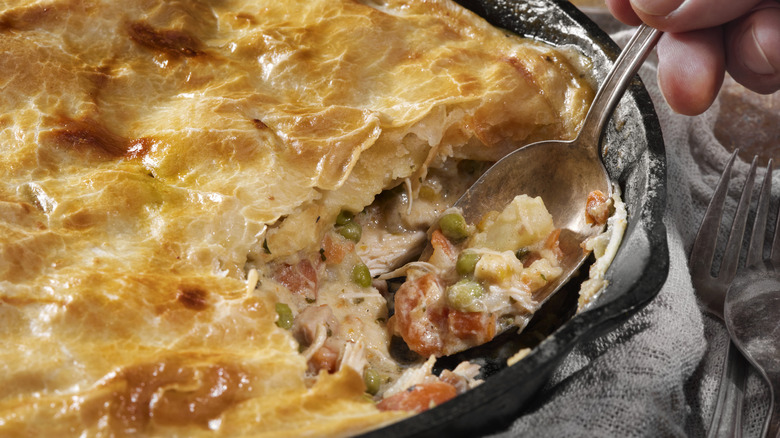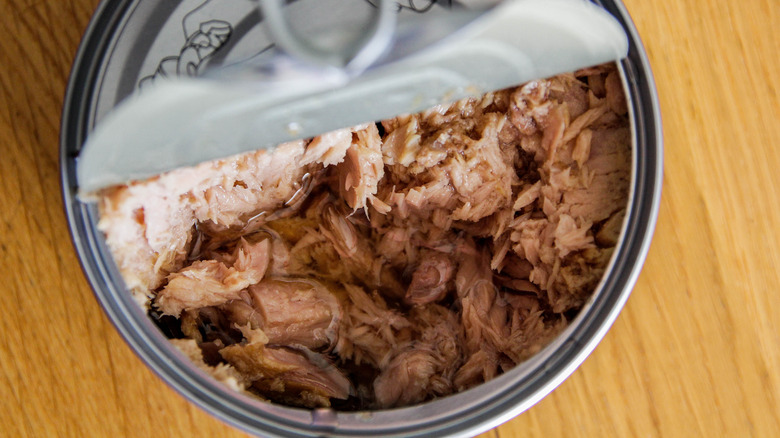Canned chicken can be a quick and convenient source of protein for meals and recipes. But when it comes to preparing canned chicken, many cooks debate whether rinsing it first is necessary or beneficial. In this article we’ll examine the common arguments surrounding rinsing canned chicken and provide tips for handling it to get the best results.
The Purpose of Rinsing Canned Chicken
The main reason people rinse canned chicken is to remove excess sodium from the packing liquid Canned foods often contain high amounts of sodium as a preservative One study found canned chicken can contain up to 18% of the daily recommended sodium intake in just the liquid. Rinsing is said to reduce the sodium content by 20-80%.
Rinsing also helps remove any metallic taste from the can itself. The canning process and extended storage time can leave chicken with a tinny or overly briny flavor. A quick rinse washes away the packing liquid responsible for these unwanted flavors.
Finally, some rinse canned chicken out of habit or belief it improves safety. However, rinsing for safety is unnecessary as the canning process itself kills any harmful bacteria. As long as the can isn’t damaged, the contents are sterilized.
Reasons Not to Rinse
Despite the benefits, there are drawbacks to rinsing canned chicken. Rinsing may wash away flavorful juices and natural salt that absorbed into the meat during canning. This can result in blander taste and drier texture.
Nutrients like vitamins and minerals may also be lost when rinsing. And for recipes where chicken is a background ingredient, the salty taste may not be detectable anyway.
Finally, some argue rinsing provides minimal benefits. Studies show rinsing reduces sodium content by just 25-30% on average. The chicken still requires additional seasoning and cooking for best flavor.
Alternatives to Rinsing
For those who want to avoid rinsing canned chicken, other options exist:
-
Drain and pat dry – Remove excess liquid and moisture without rinsing.
-
Use in cooked dishes – Thorough cooking enhances flavor and kills bacteria.
-
Buy no-salt/low-sodium – Choose lower sodium options if salt intake is a concern.
-
Use water-packed – Packed in water, not broth, reduces unwanted flavors.
-
Add seasonings – Herbs, spices, marinades can heighten flavor.
-
Sauté aromatics – Caramelized veggies like onions impart richness.
Best Practices for Handling Canned Chicken
To safely handle canned chicken:
-
Inspect for damage – Bulges, dents, or corrosion may indicate contamination.
-
Check expiration date – Shelf life is typically 1-5 years but don’t use if expired.
-
Refrigerate after opening – Store opened canned chicken in the fridge up to 4 days.
-
Cook thoroughly to 165°F – Use a food thermometer to ensure safety if not rinsing.
-
Adjust seasoning – Rinsed or not, seasoning is often needed to optimize flavor.
-
Use proper food handling – Wash hands, avoid cross-contamination, etc.
Tips for Using Canned Chicken
Here are some ways to put canned chicken to delicious use:
-
Shred and add to salads, wraps, pitas for an easy protein boost.
-
Make chicken salad or sandwich fillings by combining with mayo, mustard, herbs.
-
Add to casseroles, pasta, soups, and stews to quickly bulk up nutrition.
-
Use in place of raw chicken in many recipes since it’s pre-cooked.
-
Make quick snacks like quesadillas, nachos, flatbread pizza with canned chicken.
-
Fry or bake into patties, nuggets, fritters for an easy entree.
-
Mix with barbecue sauce, buffalo sauce, or jerk seasoning for bold flavors.
The Verdict on Rinsing Canned Chicken
When it comes to rinsing canned chicken, the choice depends largely on personal preference, health needs, and intended use. Rinsing may provide some benefits but isn’t strictly necessary for safety with properly handled canned goods.
Try rinsing and not rinsing canned chicken in your own cooking to see which method you prefer. Look for lower sodium options or add your own flavors to compensate if needed. Follow basic food safety practices and use canned chicken’s convenience to create simple, nourishing meals.
With the right techniques, canned chicken can be a handy kitchen staple whether you rinse it or not. Let your taste buds, health goals, and recipe guide you in making the call.
:max_bytes(150000):strip_icc()/Rinsing_Chicken_001-4215afb4f8ff49c1b6517eeb41597fe8.jpg)
Only using it in cold dishes

Whats the first dish you can think of that uses canned chicken? If youre like most people, you probably answered chicken salad, and while even the most basic chicken salad recipe can become something special with a bit of TLC, you shouldnt make the mistake of leaving the canned poultry on standby until your next picnic. Sure, canned chicken is cold on arrival, but whether or not it stays cold is entirely up to you.
To switch up how you use this pantry staple, try swapping it in for regular chicken when making a pot pie (pro tip: You can even use canned veggies, too). In the same vein, try adding it to casseroles, dips, and other hot dishes that call for chicken — once the meal is heated through, you wont know the difference. If you usually find the texture of canned chicken displeasing, dont be afraid to cook it in a pan for a sizzling upgrade. While it might not develop the same char as a grilled chicken breast, it will develop a tasty, crispy exterior and give your whole dish a texture boost. As a bonus, canned chicken comes pre-cooked (if specified on the label), so you wont even have to worry about it reaching that food-safety threshold of 165 degrees Fahrenheit — you can just focus on texture and temperature. Upon achieving your desired crunch and heat, add the chicken to sandwiches, soups, or whatever else your heart desires.
Ignoring strange colors or smells

Sure, canned goods last practically forever, but every rule has exceptions. If you open a can of chicken and encounter a strong, unpleasant smell, strange coloration, or sticky residue, you should think twice before dumping the contents into a bowl with the rest of your enchilada filling — that chicken has already spoiled. Like its taste, chickens scent should be mild and barely noticeable. A sour, rotten odor is a dead giveaway that your chicken has crossed the road, so to speak. Likewise, chicken fat should be white and the flesh a light pink hue. There should be no slimy coating on the outside, and no coloration thats green, gray, or yellow.
That said, dont think you have to toss an entire can of chicken just because you catch a whiff of something unfamiliar. Every bird is different and senses are subjective, so get a second opinion if youre unsure whether or not your canned chicken smells off. In isolation, minute changes in color or smell dont automatically indicate spoilage, but in combination, those chances multiply. If the can is undamaged, your can of chicken is probably fine, but remember: Youre in charge of your body and what you put in it. If you genuinely think something could be spoiled, err on the side of caution and dont eat it.
Curious Minds? Can You Dehydrate Canned Chicken? + Recipe
FAQ
Can you eat canned chicken straight from the can?
Should you rinse canned goods?
If you’re wondering whether rinsing canned vegetables is necessary, there are certain situations where rinsing is beneficial: Remove excess starch or sugars: Some canned items like corn, sweet potatoes, and beans are packed in liquids that contain added starches or sugars. Rinsing helps eliminate these before use.Mar 27, 2025
Does rinsing canned chicken remove the sodium?
Once the canned chicken has been thoroughly rinsed, it should taste a lot less processed. Along with enhancing the taste, rinsing canned foods is also a very efficient method for removing the extra sodium.
Can you use the liquid from canned chicken?
Save the flavorful liquid by draining it into a container and storing it in the refrigerator for later use. Use it as a substitute for water when cooking rice. Boil your ramen noodles in the chicken juice for added flavor.Mar 31, 2024
Does chicken need to be rinsed before cooking?
No, your chicken does not need a rinse. Toby has been a nutrition expert at FoodNetwork.com for 16 years. She is an award-winning registered dietitian and the author of 10 published cookbooks. Do you rinse raw chicken under the kitchen faucet before cooking it?
How do you clean a chicken after rinsing?
After rinsing a raw chicken, make sure to clean your sink and surrounding kitchen top with bleach. This is to ensure that any potential bacteria aerosolized during the rinsing process is eliminated (especially the sink, especially the drain and faucet handles).
Does rinsing Chicken make it safe to eat?
Even today many folks believe that rinsing chicken can wash away pathogenic bacteria and make the chicken safe to eat. We’re here to settle this debate once and for all. Raw chicken can be contaminated with numerous pathogenic bacteria including Campylobacter, Salmonella, and Clostridium Perfringens, all of which can lead to foodborne illness.
Should you rinse raw chicken before cooking?
According to the FDA, 67% of people believe that rinsing raw chicken is helpful. I even conducted an informal Instagram survey and found that 58% of people rinse their raw chicken, while 42% don’t. Considering raw chicken’s nastiness, this is a valid question.
Can you eat canned chicken?
Overall, with canned chicken, the key thing is discipline. While it is safe to eat this canned meat due to the level of sodium phosphate present, you still need to consume it in moderation. How Is Canned Chicken Made? Very little equipment goes into making canned chicken. You will require a pressure cooker, canning jars, and the chosen ingredient.
Is it necessary to wash off chicken?
The FDA states that mostly water is absorbed by the chicken during the chilling process. Blood is removed from poultry during slaughter, and only a small amount remains in the muscle tissue. An improperly bled chicken would have cherry red skin and is condemned at the plant. However, the author expresses her preference for washing off the chicken.
